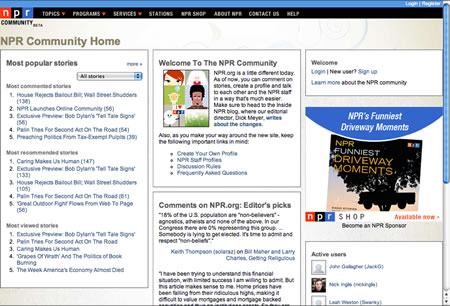 I’m not referring to Barack Obama’s 1980’s job, but the growth of social networks, from MySpace and Facebook, to LinkedIn and Classmates.com. More and more, these digital connectors are springing up all over the Internet.
I’m not referring to Barack Obama’s 1980’s job, but the growth of social networks, from MySpace and Facebook, to LinkedIn and Classmates.com. More and more, these digital connectors are springing up all over the Internet.
In fact, public radio now has its own official social network – NPR Community. It’s a way for fans of NPR to discuss their favorite shows and hosts, as well as share and comment on stories. Dick Meyer, NPR’s Editorial Director of Digital Media, is hopeful that listeners will participate, along with NPR employees themselves. As he notes, "Clearly, this isn’t just a new way to rake in more page views; NPR wants interaction not only between its audience, but with its actual staff as well."
Meyer thinks that NPR is getting into social networking on the late side, but the reality is that this audience is probably right at the point where interacting with one another online is desirable. It is worth noting that most commercial stations have not ventured into social networking, despite evidence in research (including our last two Tech Polls) that their audiences are involved on a myriad of these sites. Of course, a viable radio station social network requires programming that is worthy of comment and interaction. Many stations are sorely lacking in that department. But many others have the hosts, the programming, the heritage, and the community roots to pull this off.
A radio station social networking initiative is about engagement. It is about providing listeners with the chance to discuss, dig deeper, and get even more emotional about your people and your programming. Until now, the audience has been forced to remain passive, with the exception of showing up at station events. With social networking, they can get in the game, participate, and become more loyal and knowledgeable about a station and its brand.
It’s just a matter of providing them with the means to connect with one another. We see this at focus groups and Listener Advisory Board groups. Ten strangers come together to talk about your station, and end up in the parking lot, arguing and sharing their views about music, bands, and yes, your station. Many other consumer brands would kill to have the type of emotional connection that many stations have with their customers. NPR is well on the way to making it happen for an audience that is smart, engaged, and eager to amp up their relationship with the network and its audience.
That’s connecting the digital dots.
- What Is It With Female Robot DJs? - April 30, 2025
- Why “Dance With Those Who Brung You” Should Be Radio’s Operating Philosophy In 2025 - April 29, 2025
- The Exponential Value of Nurturing Radio Superfans - April 28, 2025





the thing that npr has going for them is their national reach and an engaged audience. i think it’s going to be pretty difficult for local radio stations, even in larger markets, to attract enough listeners to participate in their exclusive social network, essentially trying to peel them off of myspace, facebook, etc. people have network fatigue – meaning they belong to too many networks (Engage.com, Friendster, hi5, Hyves, imeem, LinkedIn, MySpace, Ning, Oracle, orkut, Plaxo, Salesforce.com, Six Apart, Tianji, Viadeo, classmates.com, facebook) and adding another to the mix is going to be difficult. i can imagine people signing up, but actually using the space to connect with peers seems unlikely. i’ve looked at some of the clear channel sites and it’s fairly desolate. myspace and google have teamed up to create opensocial – the first company to offer opensocial networks to radio stations will be in a good position.